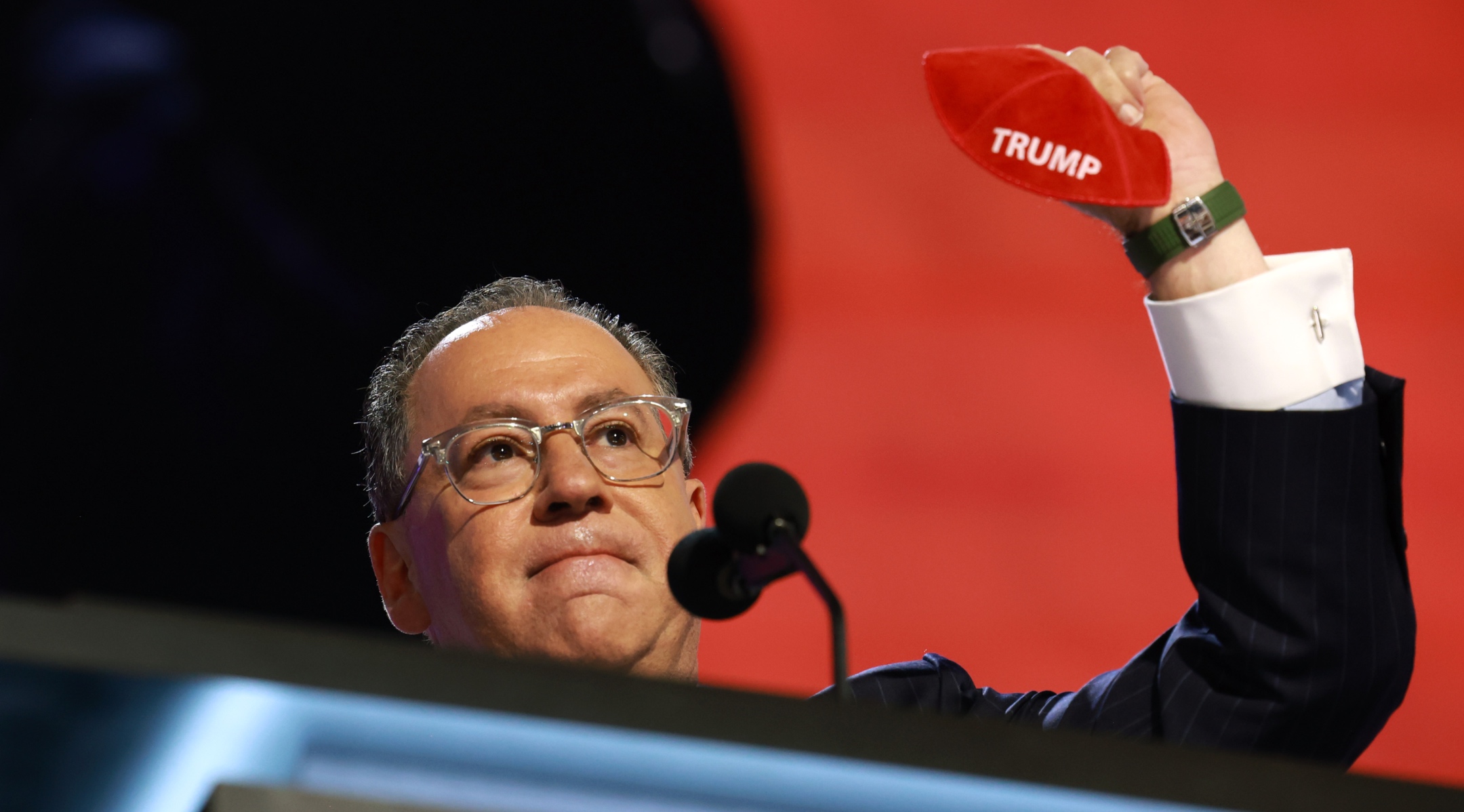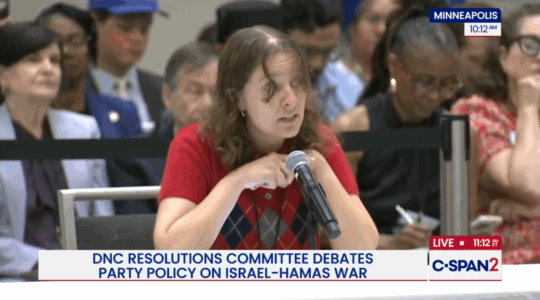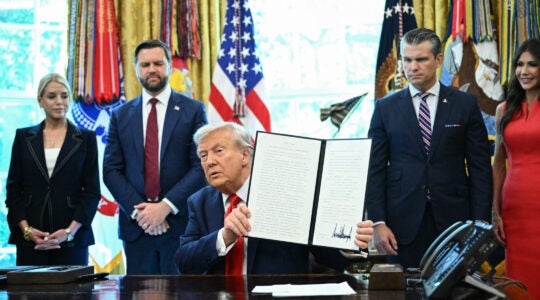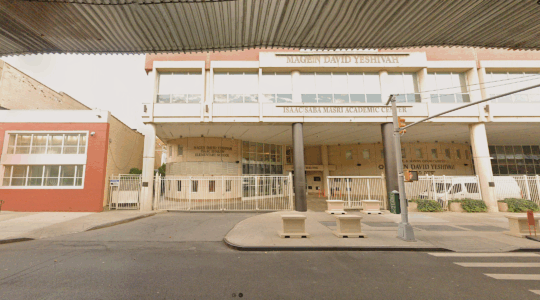MILWAUKEE — At an unprecedented time for American Jews, Republican Jewish Committee CEO Matt Brooks did something Tuesday night that was unprecedented for him: He spoke at the Republican National Convention.
“President Trump will bring back law and order so that American Jews can once again wear a kippah and walk the streets without fear,” Brooks said in a fiery speech, waving a red kippah emblazoned with Trump’s name. “President Trump will stop the mobs on college campuses so Jewish students feel safe when they go to class.”
For decades, Brooks has been attending the quadrennial confabs where the party’s platform and presidential ticket are set. This year was the first time that organizers invited him to address the convention, in an indication of how intent Republicans and Donald Trump’s campaign are on seizing the mantle of which party better protects the Jews.
At the time of the last convention in 2020, violent antisemitism was more often identified with far-right agitators who embraced racist and antisemitic conspiracy theories about immigrants; one such theory, which an array of Republicans have echoed, animated the man who murdered 11 Jews in their Pittsburgh synagogue in 2018.
Now, American Jews have been on edge as reports of antisemitism in the United States have spiked since Oct. 7, when Hamas attacked Israel, spurring a war in Gaza and inaugurating a wave of pro-Palestinian protests. Jewish organizations have in part shifted their focus to college campuses, where pro-Palestinian demonstrations have been widespread and sometimes accompanied by clashes between pro-Israel and pro-Palestinian students.

Linda Stoch, left, and Michelle Terris, right, hold up Jews for Trump signs at the Republican National Convention, Milwaukee, July 16, 2024. (Ron Kampeas)
Throughout Tuesday, the convention’s second day that was focused on security concerns, speakers referred to the recent anxieties of American Jews.
New York Rep. Elise Stefanik, whose tough questioning last fall led to the departure of presidents of Harvard and the University of Pennsylvania who equivocated when she asked them if calls for genocide violated their universities’ codes of conduct, said anti-Israel protests on campuses reflected norms among Democrats.
“What has been the response from the radical left on our college campuses?” she said. “Vile antisemitism, chanting ‘Death to Israel, death to Jews, Death to America.’”
She added, “This is Joe Biden’s Democrat [sic] Party. President Trump will bring back moral leadership to the White House, condemning antisemitism.” (In fact, Biden has denounced intimidation of Jewish students on campuses, and of illegal acts by protesters.)
Trump’s most bitter rivals during the primaries, former South Carolina Gov. Nikki Haley and Florida Gov. Ron DeSantis, endorsed him without hesitation. Haley’s speech was extraordinary because until weeks ago she had said she would vote for Trump, but not support him.
Why did she make the shift? In part, she said, because of the dangers she said Jews face. “The Jewish community is facing an obscene rise in antisemitism,” Haley said.
And Brooks said Trump was key to curbing hatred of Jews. “Here at home, under Donald Trump, we will put a stop to the rising tide of antisemitism,” he said in his speech.
The identification of conservatism with defending Jews was in evidence a half a block away, where Concerned Women of America set up a pink tent where women interviewed each other about the blessings babies bring.
Nearby, a pink bus was emblazoned “American Women Want,” with answers provided in faux graffiti: “America First,” “Girls sports for girls only,” “Choose life, your mom did,” “Stand with Israel” and “Stop Antisemitism.” Beneath the last slogan someone had scrawled a patch of real graffiti: “Christ is King,” accompanied by a crucifix.
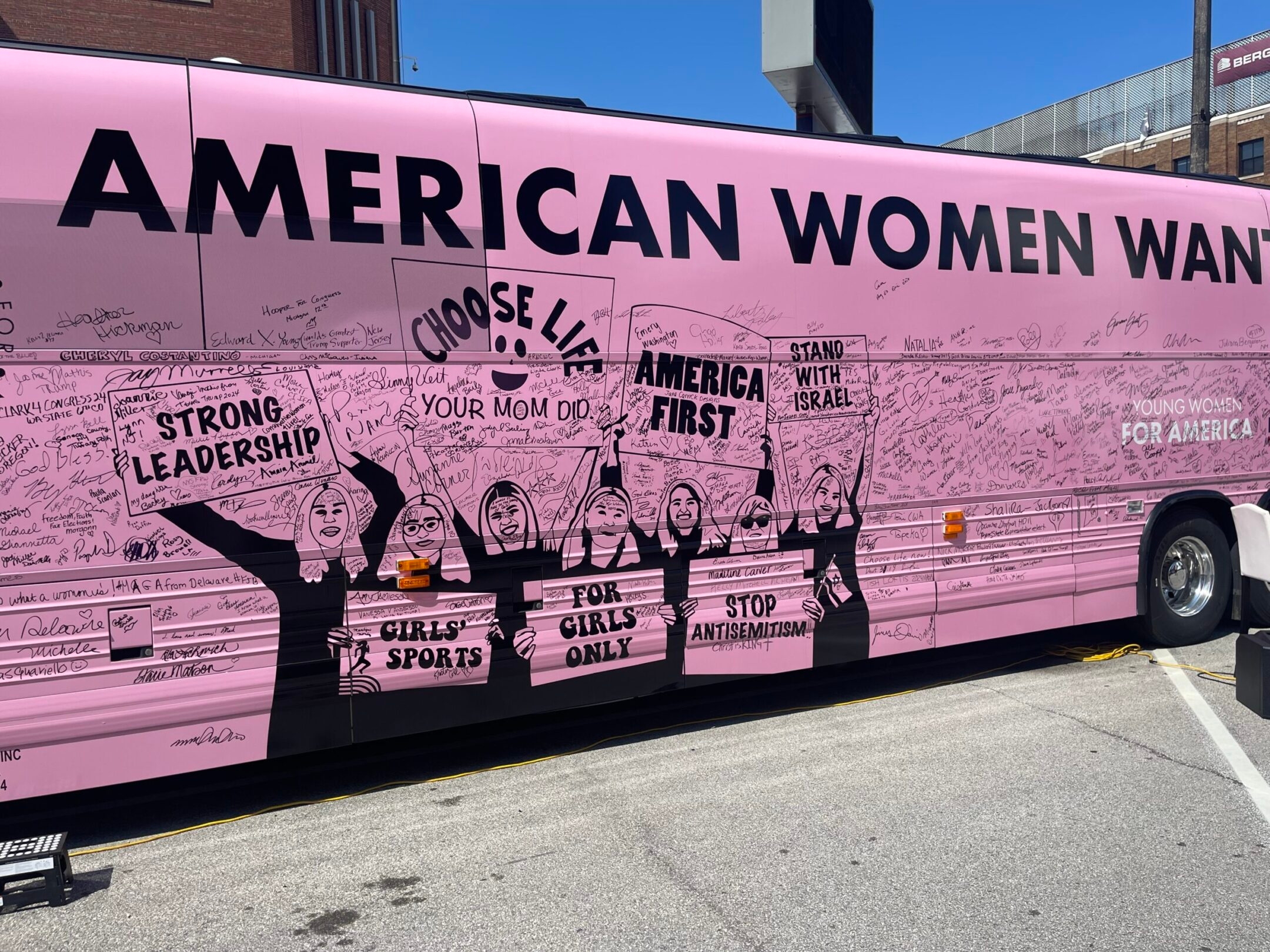
A bus brought to the Republican National Convention by an anti-abortion group equated supporting Israel and opposing antisemitism with anti-abortion and anti-trans attitudes. (Ron Kampeas)
American Jews historically have voted predominantly for Democrats in national contests, and polls show that a clear majority of American Jews plan to vote for President Joe Biden, the incumbent and likely Democratic candidate in November. But the proportion of Jews voting for Republicans has increased in the last decade, polls show, and some Jewish Democrats have since Oct. 7 found themselves uneasy with attitudes within the party toward Israel and combating antisemitism.
One of those is scheduled to address the convention on Wednesday. Shabbos Kestenbaum, a recent graduate of Harvard’s divinity school who says he voted for Bernie Sanders in the 2020 Democratic primary and remains a registered Democrat but feels abandoned by the party in the wake of Oct. 7. Kestenbaum is suing Harvard for allegedly failing to protect Jewish students from discrimination last year.
Linda Stoch, 71, from Palm Beach County, Florida, said she had sensed a change. “I do voter registration and when I go out, the Jewish people are switching their votes because they don’t like the way Biden is treating Israel,” she said from her seat in the Florida delegates section, where she cheered Israel’s every mention and raised a placard almost as large as she was that read, “We Are Jews for Trump.”
Stoch was shouting over a recorded message from Trump decrying what he said was the decline of law and order, the theme of much of the evening.
Trump has argued that Biden’s border policies have made America less safe. Earlier in the day, the convention sent reporters a list of victims of crimes by undocumented migrants. During the convention, the victims’ names came up frequently, cited by politicians and in wrenching speeches by surviving family members.
There were plenty of anecdotes making the case that undocumented immigrants present a unique danger, but no speaker presented evidence that migrants are likelier to commit violent crimes than any other demographic. (An array of studies have found that they are not.)
The Republican platform adopted in advance of the convention promises “the largest deportation operation in American history,” alarming Jewish groups that have supported immigration in line with long-standing attitudes held by American Jews on both the right and left.
Brooks’ speech did not address immigration at all, instead centering Israel in addition to antisemitism concerns.
“Hello Milwaukee! Let me hear you cheer if you support Israel!” he said, and the tens of thousands of people packed into the arena let out a roar. “Now, if someone tried that at the Democrats’ convention, they’d be booed off the stage! But here at the Republican Convention, we proudly and loudly stand with Israel!” (The Democratic Party adopted a pro-Israel platform on Tuesday in advance of its own convention next month.)
Even Jews who attended the convention for reasons other than politics said they felt the solidarity. Tucked into a tent market on the convention grounds, among gift shops and Trump merchandise outlets and facing a stage graced with a country music singer in white cowboy boots and a light blue dress, was a Chabad Wisconsin outlet.
Rabbi Dov Lisker, 32, said the booth’s goal was to make it possible for Jews attending the convention to get kosher food or to join one of three daily services without having to breach security barriers to reach local synagogues. But he said he was also getting a substantial number of non-Jews stopping by to express support.
“They’ll say, ‘So sorry for what you and your people are going through,’” Lisker said.
JTA has documented Jewish history in real-time for over a century. Keep our journalism strong by joining us in supporting independent, award-winning reporting.
